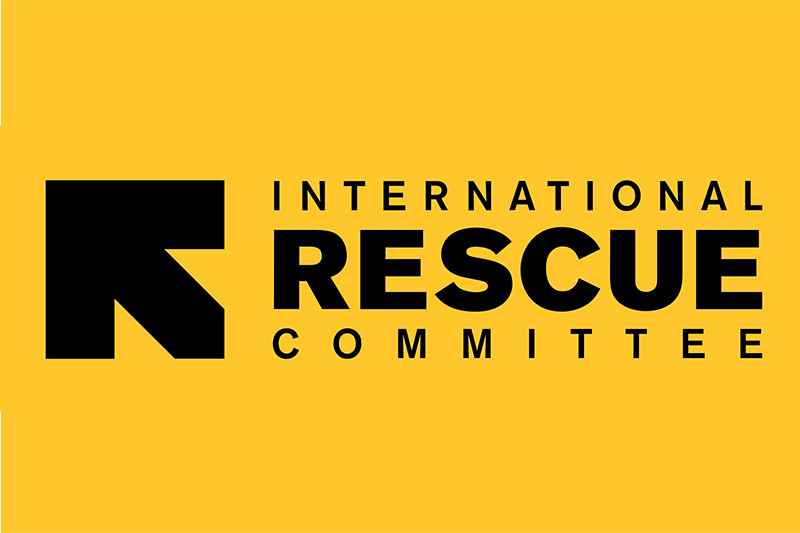Small businesses are the engine of the U.S. economy. According to the Small Business Administration, there are over 33 million small businesses in the U.S., accounting for over 99% of all firms. These businesses help build stronger communities by creating jobs and contributing to economic growth. Between 1995 and 2021, small businesses accounted for 62.7% of net new jobs and, in the past year, they accounted for 43.5% of the entire GDP for the U.S.

Diana Muturia came to the U.S. when she was 18. She started a company
to help immigrants have a better digital presence and find work. Credit: IRC
Small businesses are being created across the U.S. at record rates. The advent of digital tools and platforms has leveled the playing field to an extent whereby entrepreneurs have more opportunity than ever. Regardless of background, small businesses can be created and compete on a global scale, bringing more jobs to their communities and driving more economic activity. One segment of entrepreneurship that is often overlooked is immigrant/refugee owned small businesses.
In 2019, immigrant entrepreneurs made up 21.7% of all business owners in the U.S., despite accounting for just 13.6% of the overall population. A subset of this group, refugees, account for a significant amount of economic activity in the U.S. According to the New American Economy report, refugee-owned businesses generated $4.6 billion in income in 2015. Refugee-owned businesses are also being created at the fastest rate compared to other business owners.
Access to capital is a key component of driving small business success. A recent report from the National Federation of Independent Businesses reported the highest percentage of small- and medium-sized businesses citing financing as a top priority since December 2018.
For entrepreneurs just getting started, credit score is among the most critical factors in determining their access to capital. For those businesses already launched, access to capital often requires detailed financial statements, projections, and collateral, in addition to good credit of the owner.

Jonathan Amissa, center, is a resettled refugee who started
a medical transportation business. Credit: IRC
For too many American households, the traditional requirements for accessing capital are too great to overcome. The Consumer Financial Protection Bureau estimates that over 26 million Americans are “credit-invisible” – having no credit score and thus effectively cutting off access to all but the most predatory financial products. The CFPB also found that prevalence of credit invisibility is more acute in black, Hispanic, and low-income households. For immigrants and refugees, these traditional barriers to accessing credit are felt even more sharply. Immigrants typically have no credit history. For refugees, the challenges are compounded as most arrive with little savings, no assets, and a limited network of support.
The challenges of accessing capital have become even more acute due to the economic fallout of the pandemic, rising inflation, higher prices, and most recently the uncertainty around the banking sector after the failure of Silicon Valley Bank and Signature Bank.
Digital financing plays an important role in filling a gap in financing for small businesses that have historically struggled to access capital from a traditional financial institution. By leveraging unique underwriting capabilities, machine learning, automation and alternative credit risk models, digital financial services can reach this underserved segment of borrowers. PayPal Working Capital and PayPal Business Loan are two examples of these alternative small business lending solutions.1 While structured differently, both products have demonstrated an ability to reach into those communities where traditional financial services are leaving. In 2022, 54% of the total value of PayPal- serviced small business loans were in zip codes where 10 or more bank branches closed between 2017-2022.2 Additionally, 68.5% of the total number of small business loans serviced by PayPal in 2022 went to low- and middle-income census tracts.3

The International Rescue Committee (IRC) responds to the world's worst
humanitarian crises and helps people to survive and rebuild their lives.
Supporting small business success and ensuring that no entrepreneurs are left behind takes an ecosystem-wide effort. A fully coordinated support system linked between the public sector, private companies, and non-profits is required to provide the resources and reach needed to serve the full community of entrepreneurs and help them reach their potential.
PayPal is excited to help lift up community-based service provider partners to streamline accessibility and fill gaps in services. For example, the International Rescue Committee and the IRC’s Center for Economic Opportunity are community partners that focus on supporting refugees and immigrants overcome barriers to successful business start-up.
The IRC has supported immigrant and refugee entrepreneurs in starting and growing small businesses in a range of sectors from transportation to food businesses, childcare centers to clothing retailers and more. The IRC delivers community-based, linguistically, and culturally accessible business counseling to hard-working entrepreneurs who take pride in contributing to the economic health of their communities and are committed to leaving a legacy to their families and future generations. They have been committed to this work for decades and in just the past year, have helped over 2,000 diverse small business owners with assistance and support.
A key aspect of this support is access to capital and business financing and the IRC’s subsidiary lending arm – known as the Center for Economic Opportunity (CEO) – has played a critical role in this work. Since 2015, the IRC’s CEO has closed over 475 loans with an average loan size of just $9,800. CEO’s borrowers would have few options for financing from mainstream lenders – 86% of borrowers are low-income and only 22% had a positive credit score at time of application. Forty-three percent of CEO’s loans were made to business owners who have been in the U.S. for less than five years. Yet despite making loans to clients considered too risky for mainstream lenders to consider, CEO has maintained a 98% historic repayment rate. In addition to alternative underwriting criteria that discounts credit scores, CEO’s lending model is rooted in partnerships with community-based organizations with specialized capacity and close connection to underserved communities.4
While digital financial services companies and community organizations are a key part of ensuring access to capital and a thriving small business landscape, government plays a key role as well. One such example is the Small Business Association’s launch of a $100 million Community Navigator Pilot Program. Developed in part to support the millions of diverse and disadvantaged small business owners that were reeling from the economic shock and disruption of the pandemic, this initiative has embraced a unique community navigator model that has brought hundreds of local organizations across the nation into the ecosystem of small business support and access to capital. The IRC is proud to be implementing one of the nation’s largest CNPP programs, combining its reach and experience with the talents and reach of more than 20 additional local organizations that are on the ground in regions ranging from central San Diego, California to Dekalb County, Georgia to Des Moines, Iowa to rapidly growing communities in Phoenix, Arizona. This type of government innovation – empowering localized, community-based approaches – is a critical step in ensuring thriving small businesses and access to capital for all of America’s diverse entrepreneurs.
Access to capital remains a critical tool for entrepreneurial success. It is clear that different avenues of acquiring that capital can be tailored to specific communities. While PayPal can help facilitate access to loans to small businesses underserved by traditional banks, there are still communities of entrepreneurs facing difficulty with traditional lending, where partners like the International Rescue Committee can help. Working together to bring more access to capital is crucial to ensuring that no small business is left behind.
1The lender for PayPal Working Capital and PayPal Business Loan is WebBank.
2Based on analysis of internal PayPal lending data for FY2022 against FDIC Bank Branch Counts
3Based on internal analysis of PayPal data for FY2022 as compared against FFIEC census tract demographic data
4CEO statistics are based on IRC’s internal analysis